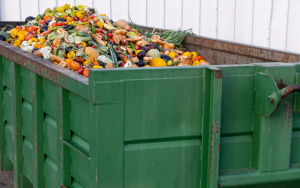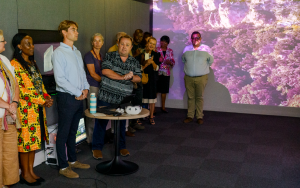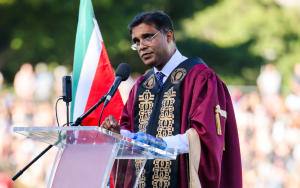
A high-level delegation led by Markus Söder, Minister-President of Bavaria in Germany, joined senior South African academic leaders for the formal signing of a series of landmark agreements between Bavarian universities and Western Cape institutions.
‘A perfect match’: SU hosts Bavarian delegation to power innovation
- SU and leading German universities formalise new partnerships under the Bavaria-Western Cape BioTech Initiative.
- The agreements aim to advance global research collaboration in health, the environment and the bioeconomy.
- The occasion showcased SU’s role as a driver of international innovation and scientific excellence.
If you were in Stellenbosch earlier this week and noticed a motorcade with flashing blue lights sweeping down Ryneveld Street, you were witnessing history in the making. Inside the Stellenbosch University (SU) Museum, a high-level delegation led by Markus Söder, Minister-President of Bavaria in Germany, joined senior South African academic leaders for the formal signing of a series of landmark agreements between Bavarian universities and Western Cape institutions.
Söder headed a delegation of German politicians, university leaders, business representatives and journalists to the Western Cape as part of an official visit celebrating 30 years of partnership between Bavaria and the province. The highlight was the official launch of the Bavaria-Western Cape BioTech Initiative, a flagship collaboration that will drive joint research, talent exchange and innovation in biotechnology between the two regions.
“This gathering is both symbolic and practical in purpose,” said Prof Deresh Ramjugernath, Rector and Vice-Chancellor of SU, in his welcoming remarks. “It provides a foundation for research exchange, entrepreneurial development, innovation driven companies and a shared approach to addressing global challenges such as disease control, sustainable development and technology advancement. We are excited by the real and lasting outcomes that this collaboration is positioned to create.”
The audience, which included representatives from both the Western Cape Government and regional higher education institutions, was welcomed by Robert Kotze, Senior Director of SU International. Switching effortlessly between English and German, Kotze delighted the guests with his linguistic wit, setting a warm tone for the afternoon’s proceedings.
‘A perfect match’ for innovation
In his keynote address, Söder described Bavaria and the Western Cape as “a perfect match” – two regions bound by excellence in research, a dynamic entrepreneurial spirit and a shared belief in the transformative power of technology.
“With the signing of our memoranda of understanding and the launch of the BioTech Initiative today, we are sending a strong signal for a new era of cooperation between Africa and Bavaria,” he said. “We are taking this collaboration to the next level, and we are very happy about it. It’s a perfect match.”
Söder highlighted Bavaria’s investment of billions of euros in research, technology and universities and emphasised that the partnership with SU and other institutions in the Western Cape would ensure that innovation directly benefits society.
He also drew attention to the long-standing partnerships between Bavarian and South African universities, including LMU Munich’s joint research fund with SU and the nearly two-decade relationship between TUM Munich and SU. The connection between UnternehmerTUM and SU’s LaunchLab was singled out as a model for transcontinental collaboration. “You are Africa’s leading startup incubator,” Söder said. “That’s a good marriage, I would say, for both sides.”
Referring to Bavaria as “the Silicon Valley of Europe,” he described the new BioTech Initiative as a major step toward building joint research and innovation projects, developing exchange programmes, and creating international funding opportunities. “If technology and science succeed, then we all succeed,” Söder concluded.
Building a trans-continental biotech ecosystem
Martin Reichel, CEO of the Bavarian Research Alliance (BAYFOR), noted that the new initiative aligns with the European Commission’s strategy to make Europe the world’s most attractive location for life sciences and biotechnology by 2030. “Both Bavaria and the Western Cape are advancing biotechnology at the highest level,” he said. “By combining our strong research institutions, dynamic startup ecosystems and shared interest in innovation, we strengthen our global competitiveness.”
Reichel explained that the BioTech Initiative will establish a permanent Research and Innovation Alliance between universities, research institutions and innovation-oriented organisations from both regions. Its objectives include promoting sustainable biotech solutions for health, food security and climate protection, as well as enhancing knowledge transfer and talent mobility through joint summer schools and fellowships.
BAYFOR, he added, will coordinate the scientific development of the project and help secure additional European funding. “We believe we can raise significant resources for this partnership,” Reichel said. “We will be there to ensure that these memoranda of understanding lead to real results.”
World-class universities
Prof Tulio De Oliveira, Director of SU’s Centre for Epidemic Response and Innovation (CERI), described the initiative as the next chapter in a long history of collaboration between South Africa and Germany. De Oliveira, who worked closely with German scientists and officials during the Covid-19 pandemic, said he was “thrilled to extend this cooperation with Bavaria through biotechnology.”
“What we’re trying to do here at Stellenbosch is to develop an entire ecosystem – from incubation and acceleration to manufacturing – that mirrors the model Bavaria has built so successfully,” he said. “Our LaunchLab already hosts several biotech companies, including one producing the enzymes used in mRNA vaccines in South Africa.”
De Oliveira outlined SU’s growing portfolio of more than 50 companies, including ten in the biotech sector, and pointed to the WHO mRNA Hub – launched at SU – as a “first success story” of the Western Cape’s biotechnology ecosystem. “Like Bavaria, the Western Cape has world-class universities, entrepreneurial culture and access to investors,” he added. “It is the perfect place to build the biotech industry in Africa, for Africa, in partnership with Bavaria.”
A celebration of science and culture
The formal proceedings concluded with a message from Dr Ivan Meyer, Western Cape Minister of Agriculture, Economic Development and Tourism, who proudly reminded the audience that he is a SU alumnus. “Our government has adopted a philosophy that stresses the importance of data, science and evidence,” Meyer said. “Universities are central to that focus. I’m proud of our institutions in the Western Cape and equally proud of those in Bavaria, where I’ve had the privilege of visiting several institutions.” He ended his speech with a phrase that resonated across languages and continents: “Wissenschaft ist sehr wichtig.” (“Science is very important.”)
As the official signing ceremony gave way to a South African braai and lively music in the Museum courtyard – complete with German sausages that proved a favourite among the guests – the mood was one of optimism and camaraderie.
The following bilateral agreements for building partnerships were signed:
- LMU München: Framework for developing Joint PhD programmes built on the emerging research collaborations.
- TU München: Famework for expanding student mobility and confirming increased joint research collaboration.
- Unternehmer-TUM: Framework for the existing collaboration with the LaunchLab to leverage the potential of the significant TechTransfer ecosystems.
- Neu-Ulm University of Applied Sciences: Framework focusing on collaboration with the Faculty of Science (Biofoundry research group).
- University of Bayreuth: Framework for moving beyond existing student mobility opportunities to foster research collaboration, reviving a previous collaboration in African Studies.



























